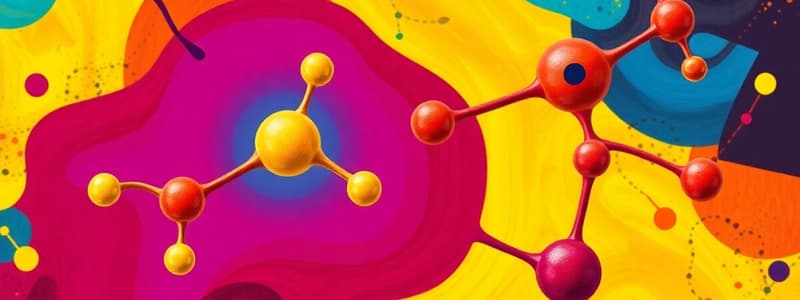Podcast
Questions and Answers
What are drugs that mimic acetylcholine (Ach) called?
What are drugs that mimic acetylcholine (Ach) called?
Cholinomimetics
Cholinomimetics are divided into what two categories?
Cholinomimetics are divided into what two categories?
- Muscarinic receptors and nicotinic receptors
- Alkaloids and choline esters
- Ach receptor stimulants and cholinesterase inhibitors (correct)
- Direct-acting drugs and indirect-acting drugs
What is the name for the type of cholinomimetic that directly stimulates Ach receptors?
What is the name for the type of cholinomimetic that directly stimulates Ach receptors?
Direct-acting cholinomimetics
What is the name for the type of cholinomimetic that inhibits cholinesterase?
What is the name for the type of cholinomimetic that inhibits cholinesterase?
What are the two main types of Ach receptors?
What are the two main types of Ach receptors?
Which are examples of direct-acting cholinomimetics?
Which are examples of direct-acting cholinomimetics?
Choline esters are relatively lipid soluble.
Choline esters are relatively lipid soluble.
Which of the following statements is TRUE about choline esters?
Which of the following statements is TRUE about choline esters?
Which of these choline esters has negligible effects on nicotinic receptors?
Which of these choline esters has negligible effects on nicotinic receptors?
What is the reason that Methacholine and Bethanechol have minimal effects on nicotinic receptors?
What is the reason that Methacholine and Bethanechol have minimal effects on nicotinic receptors?
What is the main action of Bethanechol?
What is the main action of Bethanechol?
Flashcards
Cholinomimetics
Cholinomimetics
Drugs that mimic the actions of acetylcholine (Ach) in the body.
Direct Acting Cholinomimetics
Direct Acting Cholinomimetics
Cholinomimetics that directly stimulate acetylcholine receptors, similar to how acetylcholine itself does.
Choline Esters
Choline Esters
A group of direct-acting cholinomimetics including acetylcholine, carbachol, methacholine, and bethanechol.
Pharmacokinetics of Choline Esters
Pharmacokinetics of Choline Esters
Signup and view all the flashcards
Acetylcholine Susceptibility to Cholinesterase
Acetylcholine Susceptibility to Cholinesterase
Signup and view all the flashcards
Methacholine's Resistance to Cholinesterase
Methacholine's Resistance to Cholinesterase
Signup and view all the flashcards
Carbachol's Resistance to Cholinesterase
Carbachol's Resistance to Cholinesterase
Signup and view all the flashcards
Bethanechol's Resistance to Cholinesterase
Bethanechol's Resistance to Cholinesterase
Signup and view all the flashcards
Bethanechol's Selective Action
Bethanechol's Selective Action
Signup and view all the flashcards
Methacholine's Oral Administration and Duration of Action
Methacholine's Oral Administration and Duration of Action
Signup and view all the flashcards
Alkaloids
Alkaloids
Signup and view all the flashcards
Muscarine: A Quaternary Amine
Muscarine: A Quaternary Amine
Signup and view all the flashcards
Tertiary Alkaloids
Tertiary Alkaloids
Signup and view all the flashcards
Nicotine's Lipophilicity and Skin Absorption
Nicotine's Lipophilicity and Skin Absorption
Signup and view all the flashcards
Acetylcholine's Effects on the Heart
Acetylcholine's Effects on the Heart
Signup and view all the flashcards
Acetylcholine's Effects on the Lungs
Acetylcholine's Effects on the Lungs
Signup and view all the flashcards
Acetylcholine's Effects on the Gastrointestinal Tract
Acetylcholine's Effects on the Gastrointestinal Tract
Signup and view all the flashcards
Acetylcholine's Effects on the Urinary Bladder
Acetylcholine's Effects on the Urinary Bladder
Signup and view all the flashcards
Acetylcholine's Effects on Glands
Acetylcholine's Effects on Glands
Signup and view all the flashcards
Acetylcholine's Effects on the Eye
Acetylcholine's Effects on the Eye
Signup and view all the flashcards
Acetylcholine's Effects on Skeletal Muscles
Acetylcholine's Effects on Skeletal Muscles
Signup and view all the flashcards
Clinical Uses of Bethanechol
Clinical Uses of Bethanechol
Signup and view all the flashcards
Clinical Uses of Pilocarpine and Cevimeline
Clinical Uses of Pilocarpine and Cevimeline
Signup and view all the flashcards
Clinical Uses of Methacholine
Clinical Uses of Methacholine
Signup and view all the flashcards
Adverse Effects of Cholinomimetics
Adverse Effects of Cholinomimetics
Signup and view all the flashcards
Treatment of Mushroom Poisoning
Treatment of Mushroom Poisoning
Signup and view all the flashcards
Contraindications for Cholinomimetics
Contraindications for Cholinomimetics
Signup and view all the flashcards
Study Notes
Direct Acting Cholinergic Agonists (Cholinomimetics)
- Cholinergic agonists mimic acetylcholine (ACh) actions
- Divided into direct-acting and indirect-acting
- Direct-acting stimulate ACh receptors
- Indirect-acting inhibit acetylcholinesterase (AChE)
- They cause parasympathetic effects
Parasympathetic Division Effects
- Eye: Constricts pupil (miosis)
- Eye: Ciliary muscle contraction for near vision, increases aqueous outflow
- Eye: Reduces intraocular pressure
- Salivary Glands: Stimulates saliva production
- Lung: Constricts bronchi
- Heart: Inhibits heart rate
- Stomach, Pancreas, Intestines: Stimulates contractions/secretions (motility)
- Liver: Stimulates digestive secretions
- Bladder: Stimulates urination
- Genitals: Causes erection
Cholinergic Agonists Classified
- Choline esters: Acetylcholine, Carbachol, Methacholine, Bethanechol
- Alkaloids: Muscarine, Nicotine, Lobeline, Pilocarpine, Arecholine, Oxotremorine
Choline Esters Properties
- Acetylcholine: Undergoes rapid hydrolysis
- Acetylcholine: IV bolus injection - effects last 5-20 seconds
- Acetylcholine: IM and SC injections cause local effects
- Methacholine: 3 times more resistant to hydrolysis than ACh, longer duration
- Methacholine: Effective orally
- Bethanechol: Negligible CVS effects, acts primarily on bladder and bowel
- Bethanechol: Preferable to Carbachol due to partial selectivity
- Carbachol: Acts on both muscarinic and nicotinic receptors
- Choline esters are lipid-insoluble, poorly absorbed and poorly penetrate the central nervous system (CNS)
Choline Esters- Clinical Uses
- Bethanechol: Postoperative paralytic ileus, postoperative/postpartum urinary retention, neurogenic bladder atony, congenital megacolon, gastroesophageal reflux
- Other uses: Dry mouth (Sjogren's syndrome with pilocarpine) and diagnosis of bronchial airway hyperreactivity (methacholine)
Adverse Effects
- Excessive salivation, sweating
- Nausea, diarrhea, abdominal cramps
- Urinary urgency
- Cutaneous vasodilation
- Bronchoconstriction
- Hypotension
Contraindications
- Bronchial asthma
- GI or urinary tract obstruction
Alkaloids Notes
- Muscarine: Occurs in poisonous mushrooms, only muscarinic actions, not used therapeutically, toxic when ingested, less well absorbed than tertiary alkaloids
- Pilocarpine, Lobeline, and Nicotine: Tertiary alkaloids, well absorbed, nicotine derived from tobacco, lipophilic, absorb through skin
Studying That Suits You
Use AI to generate personalized quizzes and flashcards to suit your learning preferences.




